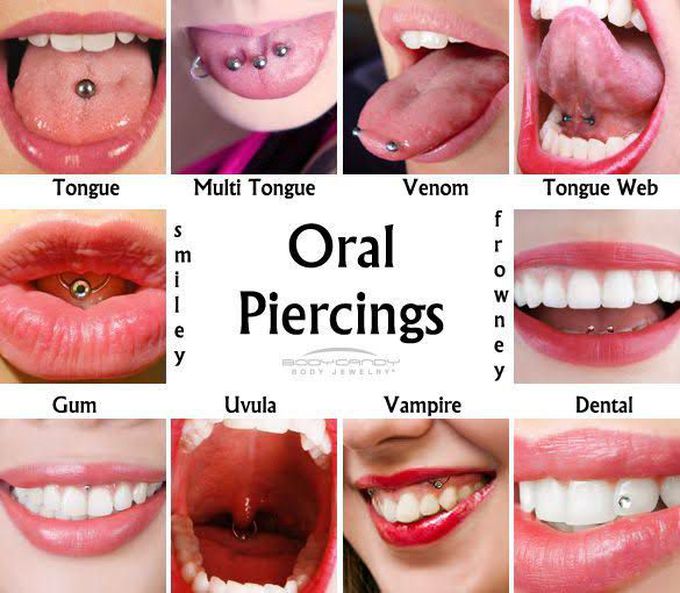


ORAL PIERCINGS AND RELATED RISKS
Oral piercing is the kind of body piercing done in or around the mouth. It include the tongue piercings, lip piercings, and cheek piercings. Due to their potential side effects oral piercings are strictly prohibited by Dental healthcare professionals. Some of their health concerning risks are as follows: INFECTION: The normal bacterial flora of the mouth gets into the piercing and can lead to infection. The mouth is at the highest risk of infection immediately after getting the piercing before the hole has healed. Touching the jewelry with hand, using tobacco products, and putting other objects in your mouth can increase your risk of infection. LIFE-THREATENING DISEASES: According to the research conducted by Cleveland Clinic, piercings with unsanitary needles can increase the risk of contracting Hepatitis B and Hepatitis C. ENDOCARDITIS : Piercings can allow bacteria to enter the bloodstream and travel to the heart thereby increasing the risk of Endocarditis. CHIPPED OR CRACKED TEETH: A potential impact of oral piercing is that the jewellery can cause tooth wear resulting in chipped or cracked teeth. If a person already has crowns or caps, they may be particularly vulnerable to damage. INJURY TO THE GUMS: Jewelry can also harm the oral soft tissues such as gingiva or gums and can cause gums recession. Recessed gums make the roots of the teeth prone to decay and periodontal disease. PROLONGED BLEEDING: If you have a blood vessel that's punctured when you get your piercing, it can result in uncontrollable bleeding and severe blood loss. Pain and swelling are common side effects of oral piercings. Other than that, interference with the normal oral functions such as chewing and swallowing can also occur. HOW LONG DOES AN ORAL PIERCING LAST? By practicing good oral hygiene and avoiding infections, your oral piercing could last a lifetime. But even with the most obsessive oral care, damage to teeth and potential ingestion of loose jewelry is always possible. HOW TO CARE FOR AN ORAL PIERCING? The first step is getting an oral piercing by a trained professional who uses sterile instruments and prioritizes cleanliness, you'll be less likely to get an infection or a disease. Avoid compulsive habits like smoking and chewing tobacco that could infect your piercing. Other things to avoid are: Playing with or rotating your jewelry. Chewing on your fingernails. Putting a pen or a pencil in your mouth. Placing the temple tips of your glasses in your mouth. Putting any other objects in your mouth that may harbor bacteria. Once your piercing has healed, be sure to remove your jewelry whenever you are eating or sleeping. If you play any sports or are involved in any other physical activities, it's essential to remove your jewelry as well. Read the full article at: https://www.colgate.com/en-us/oral-health/threats-to-dental-health/oral-piercings Image link: https://images.app.goo.gl/YtK1BCd2xuWmgUA69
I was diagnosed as a Hepatitis B carrier in 2015, with early signs of liver fibrosis. At first, antiviral medications helped control the virus but over time, resistance developed, and the effectiveness faded. I began to lose hope. In 2021, I discovered NaturePath Herbal Clinic despite my skepticism, I decided to give their herbal treatment a try.To my surprise, after just six months, my blood tests came back negative for the virus.It was nothing short of life-changing.I never expected such incredible results from a natural treatment. But it not only cleared the virus it restored my hope, my health, and my peace of mind.If you or someone you know is battling Hepatitis B, I truly encourage you to explore the natural healing path offered by NaturePath Herbal Clinic. It gave me a second chance and it might do the same for you.www.naturepathherbalclinic.com info@naturepathherbalclinic.com


